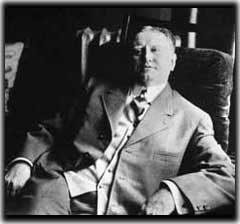| O. Henry (1862-1910) was originally born William Sydney Porter in Greensboro, North Carolina.
As a young man, he moved to Austin, Texas where he worked as a bank teller. He moved again to Houston, Texas in 1895 and became a newspaper columnist. In 1896, however, he was called back to Austin, where he was charged with embezzling money from the bank where he had worked. Not wanting to go to prison for his crime, O. Henry fled to Honduras, and stayed there for six months before returning to the United States. Upon his return, the court tried him and put him in an Ohio prison for three years. While in prison, he began writing short stories and it is there that he took the pen-name O. Henry for his writings. After his release from prison in 1901, he moved to New York, which is the setting for many of his stories. He is the author of over 250 stories and is most famous for his use of surprise or 'twist' endings. Notice the twists and surprises in the endings to "The Last Leaf", "The Green Door", and perhaps his most famous story, "The Gift of the Magi". |
 |
||||||
|
|
|||||||
| originally adverb
Originally means at the beginning of something, in this case, at the beginning of O. Henry's life. Compare this with the meaning of the adjective, original, which means 'new' or 'unique'. bank teller noun A bank teller, sometimes called a bank clerk or counter clerk, is a person who works behind the counter in a bank and deals with customers. columnist noun A columnist writes regular articles and features for a newspaper or magazine. called back phrasal verb If somebody is called back, they are requested or ordered to return to a place that they have previously left. Sometimes when products, like cars or electrical goods are found to be faulty, they are called back to the factory for repair or replacement. charged verb A court of law may charge somebody with a crime. This means that the police and court feel that it is quite likely that the person being charged may be guilty. In this case it is similar to accuse. Compare this with the meaning of charged in a shop. - "How much did they charge you?" - "Two dollars and fifty cents." |
embezzling verb
To embezzle is to commit an act of fraud (cheating) in which the embezzler seeks to steal or take money from somebody else (usually a company or organization) for their own use. It is often done through administrative work and is not the same as direct theft. fled verb To flee (flee, fled, fled) is to run away. tried verb To try somebody in a court of law is the next legal stage after charging them and finding them guilty. The person being charged goes on trial and may be found guilty or not guilty. pen-name noun A pen-name is like a nickname that is taken by a writer. They use it as the author's name on all their books. |
||||||